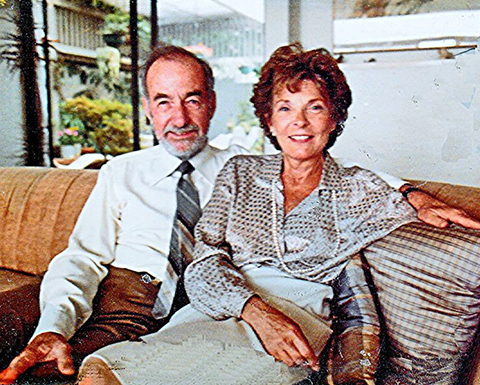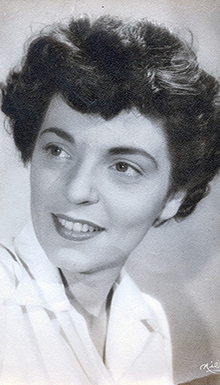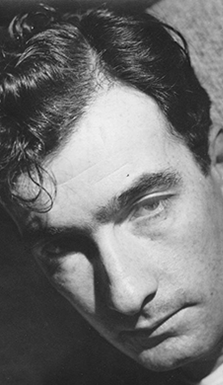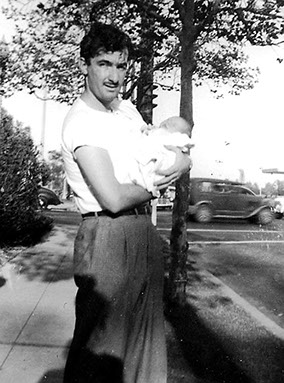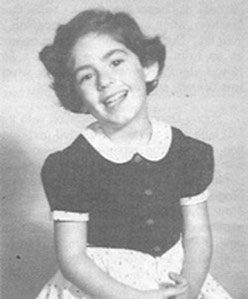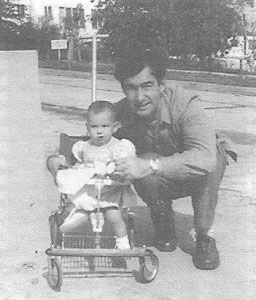Erica’s father, Fred Graff, was a Bronx, New York-born actor who studied at the New School of Social Research and the New Theater School in Manhattan. He did extensive work with the Actors’ Lab in Hollywood, and was signed to a movie contract by Columbia Pictures.
Graff appeared in at least twelve films from 1944 to 1951. His two most notable roles were among his last: The 1950 William Holden drama Union Station in a pivotal role as the leader of child kidnappers whom Holden seeks to foil (as the railway detective) and the Tony Curtis adventure The Prince Who Was A Thief (1951), playing the royal right-hand man to the star.
It was in Hollywood that Graff met the woman who would become his wife, Madeleine Rosenteil. “My mom was in the business too, but not to the extent of my dad. She was beautiful, and did some modeling.” She also did some acting, and they met at the Actors’ Lab in Hollywood.
Erica was born Donna Graff in Hollywood on July 22, 1947. (We will generally refer to her as Donna until she changed her name upon entering show business.)
When she was born, the family lived at the corner of Western and Third Street in Los Angeles. “My first childhood memory is of sleeping in a drawer, because sometimes that’s how my parents would transport me as a small child—they’d take out one of the drawers from a chest and drive me in the car.” Not much more than year after her birth, the Graffs moved to Silver Lake. Located mere blocks east of Hollywood, near Sunset Boulevard, she describes it as “the other side of the tracks” across from posh Beverly Hills.
We lived in what was called “The Project”—one row of five connected houses on hill, then another row of five. Each person owned their owned their own house, but they’d have project meetings, sort of like a condominium.”
She describes the social environment as “progressive, maybe what some would consider left-wing.” As Cold War tensions heightened by the end of the 1940s and Sen. Joseph McCarthy in the 1950 began rabble-rousing about alleged Communists in high places, her father carefully instructed young Donna that if anyone came to the door asking questions, she was to say that she wasn’t allowed to talk to them, and that she didn’t know anything. “I later realized that was because the FBI was snooping around to find out who was a Communist.”
“My dad was blacklisted, like a lot of people who didn’t do anything wrong. He went to these project meetings, and he was politically outspoken. He also spoke his mind at parties and on movie sets. He went to meetings through the Actors’ Lab that some would consider liberal. When the blacklist came down, someone at the studio who testified [before the House Committee on Un-American Affairs] was told they could get out of trouble if they named someone else who had participated in certain meetings, and this person named my dad. He was no Communist, of course, but when they asked him to name names, he wouldn’t. By then, Columbia had already dropped his contract.”
Her dad’s movie career ended just as it was on the rise. “He, Jeff Corey, Robert Conrad, and others with the Actors’ Lab would still get together for classes and workshops. Most of them weren’t working because of the blacklist.” With one chapter of his life over, Fred Graff provided for his family by selling televisions and home furnishings. He later became an interior designer and would take occasional jobs, even in semi-retirement.
When Donna was four years old, her mother contracted polio, and became pregnant before the disease had been diagnosed. Polio was perhaps the most terrifying of all diseases in America during this era. 1952 was the peak of America’s polio epidemic, attacking some 58,000 children that year and killing about 1,400; a year later the introduction of the Salk vaccine began the gradual near eradication of the crippling disease. “My mother was taken to the hospital, and was there for about seven months. I had no idea what was happening.” Her sister Lisa was born prematurely in an iron lung while her mom was temporarily paralyzed—as reported in the L. A. Times, the first ever child born in this device, designed to help her breathe.
“The night when my sister was born, I had a nanny staying at the house. I woke up in the middle of the night, and my dad had left a note on the bed that I couldn’t read. I just got hysterical because I thought my dad had gone away. They had to call a doctor to calm me down. I don’t remember any of this, but it was pretty traumatic.”
Of course, from the standpoint of her father, he had been professionally blacklisted and was facing the possible loss of his wife and new baby, so the distress he was undergoing was far deeper than a four-year old could possibly understand…
In school, the kids used to gang up on me, and they’d brand me. They’d hold me down, put tape on my arms, and pull it off. Whenever we’d play ‘pony’ in the schoolyard, I was never allowed to be at the front; I’d always be in the back.” Growing up Jewish sometimes presented its own challenges. “Silver Lake is pretty multi-cultural. But it’s mostly upper-middle-class—which we did not fall under. We were middle-class, not upper, and there was a big distinction in that small difference. Most of the kids in my school were not Jewish. It was one more thing that made me different, and when you’re a kid you want to feel like I belonged at home, much less at school or with my peers.
“When I was ten, before my parents got up every Sunday morning, I would sometimes go to the small Presbyterian church at the bottom of our street for the 7:30 a.m. service. I don’t think it was a denial of my religion, but maybe wanting to have some higher power in my life and my desire to fit in.
"I’d put on a dress, a scarf over my head, steal my mom’s nylons and a dollar from her purse, and put the dollar in the hat at church. It was all about standing there with others, feeling like I belonged, even though it was a lie, and being able to contribute like everybody else. And having someone other than myself to rely on. I think I knew, even at age ten, that I was going to have a hard time feeling a sense of self.”
A few years later came another kind of lesson in religions. “My first boyfriend, the first guy I slept with, was a great, sensitive guy. He later turned out to be gay. I lost my virginity with him in his car. He had given me an Ethiopian cross on a leather strand. I wore it, and my mother had a fit. I learned that it wasn’t OK to deny your religion, even though that wasn’t why I wore it.”
• • •
There is another part of Erica’s story that goest to the heart of the emotional struggles throughout the years. It came out somewhere around the eighteenth or nineteenth hour of our interview sessions: an event she had sublimated for many years, but which becomes crucial to understanding this string and courageous, but deeply fragile and damaged, woman.
Describing herself in the third person: “Deep down inside, there’s a part of Erica who always felt that the only reason any man was with her, was to fuck her. If they have sex with you, they would like you. That was the lie. I was always the one they were screwing around with behind their girlfriend; I was never the girlfriend. Each time I had sex with someone, it was like that definition of insanity—repeating the same action over and over again, and each time expecting a different result. I kept thinking, they’re going to love me, we’re going to be together. Well, that dream went away very quickly.
I learned very young that by using my body, I could have someone—as temporary as that was—give me all their attention.
When you’re starved, you’ll accept pretty much any crumb… Coming from that place, why would anybody love you? Obviously you don’t love yourself.”
Then she dropped the bombshell.
“I was a victim of molestation as a child.
I was ten years old. He was a neighbor. He lived in the condominium project with us, two houses down from ours. He and his wife were best friends with my parents. He was a remedial English teacher. They had an adopted son, and I used to baby-sit for him. I always hated the part when he would walk me home—all of 20 feet away—rubbing himself all over my butt. He would come over with remedial reading tests, and say he wanted to try the test on a student, and he wanted me to do it. So he’d go into a room with me, get on top of me, and orgasm. It was horrible and frightening. I didn’t really know what was happening.
“It went on for such a long time—maybe almost a year—that I gradually began to realize something was wrong here. He would come over after school, when my mom and dad were working, knock on the door, and say, ‘can I borrow a cup of sugar?’ I’d get really scared and didn’t want to let him in—‘my mom told me not to let anyone in when they were gone.’ He’d say, ‘well, you know me, I’m your mom and dad’s best friend.’ He kept finding stupid reasons to come over, then he’d get me in the corner and start fucking me.
“I didn’t know what to do, because I was sure my parents were going to think it was my fault—how could they believe that their best friend would do this?—and I would be punished. So I made up this whole story that I was walking home from school and this man was parked in the alley and he called me over and made moves on me. My mother went into hysterics—I had no idea this would happen—and decided to call the police. The police came to our house to interview me. At this point, I was really scared; it never crossed my mind to tell the police he was doing this. So I told the police that nothing happened and I made it up.
“When the police left, the whole house was in bedlam, and I started crying hysterically. Finally I told my parents what had really happened, and they totally freaked out. ‘Why didn’t you tell us earlier?’ My parents did love me, and do love me, but I guess I was afraid they were wrapped up in their own lives they wouldn’t be able to understand… My mom was crying, and my dad was furious about what had happened. It’s funny, I was very scared that this would break up [the molester’s] marriage. So I made my parents promise they wouldn’t tell his wife. I wasn’t protecting him, I was protecting his wife. Because my parents were having such problems in their own marriage, I thought the worst thing in life was when parents get divorced. My parents went to him, said they knew what he’d been doing to me, and said if he ever came anywhere near our house, or anywhere near me, they would immediately go to his wife.”
More than twenty-five years passed. Erica was in the hospital in the early 1980s after the first of her anorexia crises. “I was trying very hard to get well. After you’ve been there for a few weeks, on the weekend you can get a day pass to off the grounds, but you had to have a chaperone. My sister Lisa came to take me to dinner for my first time out. We sat in down at the booth in the restaurant in Glendale, and had just ordered. My sister said, ‘don’t look now, but you are going to die when you see who’s sitting across from us.’ Why things happen when they do—I’ve realized, I don’t need to know, because sooner or later, it will be presented to me. Here was the man who had molested me, and his wife, sitting right across from me. It was the last person I ever wanted to see.
“My heart stated beating really fast, and I started feeling numb from my toes on up. I broke out crying, and I couldn’t stop. I had been so sick, and was learning again to eat food at the hospital, so my feelings were raw—I didn’t have that armor, that sense of control. I called the hospital, hysterical, and they said ‘come straight back, we’ll be at the door to get you.’ I went into the hospital, and I think I passed out in the hallway. I just lost control of my body; it was like surrendering to the pain and anxiety.
“I haven’t thought about that in years.”

By Steve sullivan
Excerpted from glamour girls #16 SPRING 2002
Growing Up in Silver Lake
